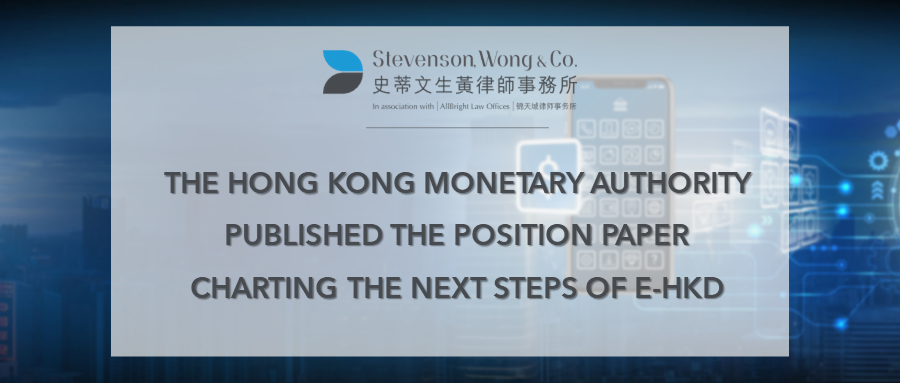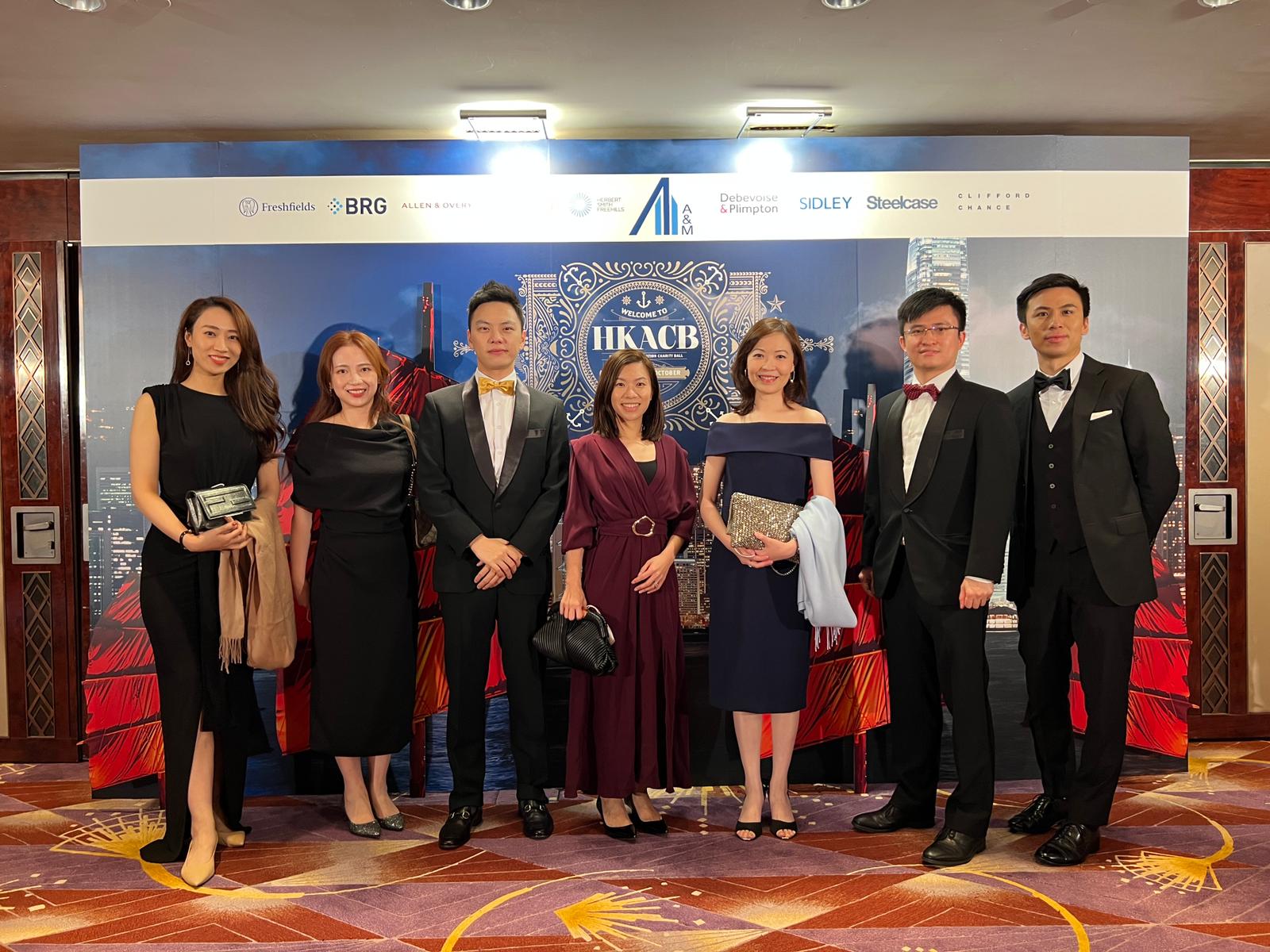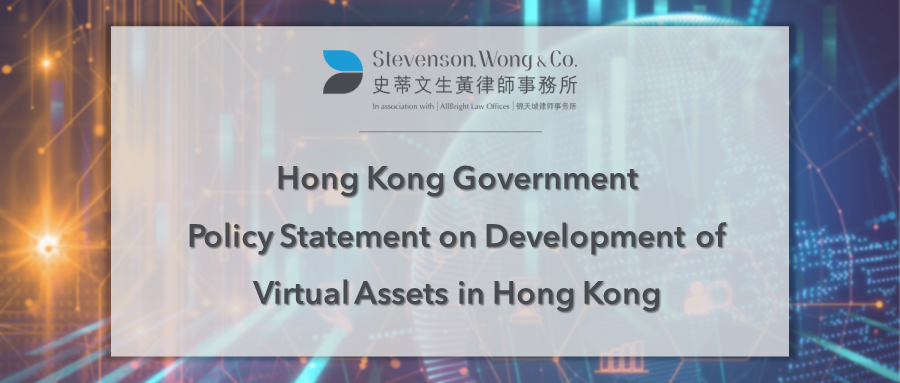This entry is only available in 中文.
THE HONG KONG MONETARY AUTHORITY PUBLISHED THE POSITION PAPER CHARTING THE NEXT STEPS OF E-HKD
Introduction
The Hong Kong Monetary Authority (“HKMA”) released a position paper titled “e-HKD: Charting the Next Steps” on 20 September 2022 (the “Position Paper”) to set out its policy stance on retail Central Bank Digital Currency (CBDC), i.e. e-HKD, and outline its next steps. Based on the findings and comments received from the technical whitepaper titled “e-HKD: A technical perspective” published in October 2021 and the policy discussion whitepaper titled “e-HKD: A policy and design perspective” published in April 2022, the HKMA considers it necessary to start paving the way for possible future implementation of e-HKD. In this news update, we will focus primarily on the development of e-HKD, its legal status, and relevant features contemplated under the Position Paper.

Charting the Next Steps of e-HKD
Set out below is the approach and model envisaged by the HKMA to implement e-HKD as discussed in the Position Paper:-
| Three-rail Approach | The HKMA will adopt a “three-rail approach”, by exploring the phases to promote and prepare for the launch of e-HKD in Hong Kong:1
|
| Two-tier Distribution Model |
|
Features of e-HKD
As explained in the Position Paper and the whitepapers, e-HKD should have the following various features:-
| Legal Tender Status |
|
| Cybersecurity and Anti-Counterfeiting |
|
| Interoperability |
|
| Anti-Money Laundering (AML)/Counter Terrorist Financing (CFT) Regulations |
|
| Data Privacy Protection |
|
| Tiered-account Structure |
|

Analysis and Takeaway
The regulators have been relatively proactive in the Fintech scene, rolling out various new regimes and guidance. With the rapid development in Fintech and VAs, the Hong Kong Government, the Securities and Futures Commission (“SFC”) and the HKMA have consistently strived to set up an effective regulatory framework for the Fintech industry in Hong Kong to prosper. The Position Paper on e-HKD is one of the many examples in this aspect.
Indeed, the Hong Kong Government has been active in establishing the regulatory framework for the Virtual Assets (“VA”) market, including the gazettal of the Anti-Money Laundering and Counter-Terrorist Financing (Amendment) Bill 2022 to introduce a new licensing regime for VA service providers (“VASPs”) which will take effect on 1 March 2023. In addition to the initial step to allow VA access under the new licensing regime. On the same day as the Financial Services and the Treasury Bureau announced its Policy Statement on Development of Virtual Assets in Hong Kong, the SFC also published a circular on the VA futures exchange traded funds (ETFs) in Hong Kong. 13
Since e-HKD is a digital form of legal tender, the Government believes the significance of e-HKD lies in its potential to serve as the potential “backbone” and anchor bridging legal tender and VA. 14 The HKMA also puts “DvP settlement of tokenised securities in its pipeline of projects for e-HKD. This would offer settlement efficiency, price stability and confidence to empower more innovations in the field of security token offerings and different types of VA, which in turn increases the competitiveness of the Hong Kong VA market and attract VASPs to operate and settle in Hong Kong. This has the potential of significantly enhancing Hong Kong’s payment efficiency through interoperability and synchronisation with the Faster Payment System (FPS). We welcome such development and look forward to the future enhancement and development of the Hong Kong Fintech ecosystem as a whole.
Please contact our Partner Mr. Rodney Teoh and our Associate Calvin KW Lo for any enquiries or further information.
This news update is for information purposes only. Its content does not constitute legal advice and should not be treated as such. Stevenson, Wong & Co. will not be liable to you in respect of any special, indirect or consequential loss or damage arising from or in connection with any decision made, action or inaction taken in reliance on the information set out herein.
1 HKMA Position Paper “eHKD – Charting the Next Steps” pp. 9-11
2 HKMA Position Paper “eHKD – Charting the Next Steps” pp. 8, 10
3 HKMA Position Paper “eHKD – Charting the Next Steps” p. 36
4 HKMA Position Paper “eHKD – Charting the Next Steps” p. 37
5 HKMA Position Paper “eHKD – Charting the Next Steps” p. 7
6 HKMA paper “e-HKD: A policy and design perspective” p. 35
7 HKMA paper “e-HKD: A policy and design perspective” p. 35
8 HKMA Position Paper “eHKD – Charting the Next Steps” pp. 15-16
9 HKMA Position Paper “eHKD – Charting the Next Steps” p. 18
10 HKMA Position Paper “eHKD – Charting the Next Steps” p. 29
11 HKMA paper “e-HKD: A policy and design perspective” p. 33
12 HKMA Position Paper “eHKD – Charting the Next Steps” p. 22
13 SFC. Circular on Virtual Asset Futures Exchange Traded Funds.
14 The Financial Services and the Treasury Bureau. Policy Statement on Development of Virtual Assets in Hong Kong.
Partner Milly Hung and Senior Associate Michael Lau Delivered a Seminar on Cyber Risk Management
On 4 November 2022, our Partner Milly Hung and Senior Associate Michael Lau delivered a hybrid seminar on “Walk through the end-to-end journey in Cyber Risk Management to get you up to speed”. They shed light on the legal issues of current cybersecurity practices, including the Hong Kong Monetary Authority’s and Insurance Authority’s compliance guidelines on cybersecurity, Personal Data (Privacy) Ordinance (“PDPO”), and the General Data Protection Regulation (“GDGR”). The seminar also invited an experienced Cyber-Security Lead in FSI (Financial Service Industry), Mr. Anthony Cheng, to explain the different types of cyberattacks and the available tools/means to tackle in Hong Kong.

From the left: Guest Speaker Mr. Anthony Cheng, our Partner Milly Hung and Senior Associate Michael Lau
For more information, please contact our Partner Milly Hung.
Stevenson, Wong & Co. Invited by Legal 500 as Exclusive Contributor to “Overview of The Hong Kong Fintech and Blockchain Landscape”
Our Partner Rodney Teoh and his team members, Associate Angela Lau and Paralegal Calvin KW Lo, have recently been invited to be the exclusive contributor to the article “Overview of The Hong Kong Fintech and Blockchain Landscape”, published by The Legal 500: Fintech Country Comparative Guide 2022.

In the article, Rodney and his team explained how Hong Kong Government and the regulators strive to set up an effective regulatory framework for the Fintech industry in Hong Kong by introducing new regimes and pilot projects for token offerings, virtual assets service providers, e-payment services, e-HKD, and more.
About The Legal 500 Country Comparative Guides
The Legal 500 Country Comparative Guides invite the world’s renowned and leading lawyers to contribute chapters on various fields in different country. The Hot Topic articles aim to provide analysis of the latest trends and developments to provide readers with a deeper understanding of the laws and regulations in different key jurisdictions.
Please click here to read the full article on The Legal 500’s website.
For more information, please contact our Partner Rodney Teoh.


(中文) 史蒂文生黄支持并参与香港仲裁慈善晚会2022
(中文) 史蒂文生黄很高兴再次支持并参与于2022 年 10 月 26 日在香港君悦酒店举行的香港仲裁慈善舞会。本所合伙人,诉讼及争议解决部主管徐凯怡律师、与黎嘉钿高级律师、卢家俊高级律师、黄晊晄高级律师、梁杰维律师、杨鸿煜律师助理和市场及传讯主管杨诗雅一起出席了本次慈善晚会。

作为香港仲裁周的一部分,香港仲裁慈善晚会旨在为亚太区仲裁之发展和支援香港慈善机构筹募善款。本所团队亦通过向本地慈善机构捐款,鼎力支持当晚的「仲裁偶像」和「电子无声拍卖」慈善活动。

本所团队鼎力支持当晚的慈善活动「仲裁偶像」(上) 和「电子无声拍卖」(下)

本所很高兴能够在本次慈善晚会上与我们的合作伙伴及业界友好会面交流,并借此机会感谢香港仲裁慈善晚会的组委会和其他支持机构筹办了如此有意义和盛大的活动。

HKIAC秘书长Dr. Mariel Dimsey (左) 和本所合伙人徐凯怡律师 (右)

若阁下想了解更多详情,请联络本所合伙人徐凯怡律师。
Hong Kong Government Policy Statement on Development of Virtual Assets in Hong Kong
Introduction
On 31 October 2022, Hong Kong’s Fintech Week 2022 commenced with the Financial Services and the Treasury Bureau (FSTB) releasing a policy statement (the “Policy Statement”) on the Government’s measures and plans for the development of virtual assets (“VA”), including discussion on its vision, approach, the new licensing regime for VA service providers (the “VASP Regime”) (see our news update on the AMLO Bill (as defined below) implementing the VASP Regime here), green bond tokenisation (see our news update on green bond here) and allowing retail investors to trade cryptocurrencies.

Vision and Approach
The Government recognised the potential of distributed ledger technologies (“DLT”) and Web 3.0 as the future finance and commerce, and has stated its readiness in supporting the VA market in Hong Kong, for example, issuance of non-fungible tokens (“NFTs”), presence of Metaverse developers and use of DLT in trade finance etc. To allow VA innovations to thrive in Hong Kong, it is important to put in place appropriate guardrails to address risks and align to international standard regulatory safeguards in relation to financial stability, consumer protection, as well as money laundering and terrorists financing.
Over the past few years, adopting the “same activity, same risks, same regulation” principle, the Government and the regulators in Hong Kong have worked collaboratively and launched a comprehensive framework to regulate VA activities in Hong Kong.
Licensing Regime for VA Trading Platforms / VA Exchanges
A licensing regime for VA service providers (“VASPs”) was first introduced by the Securities and Futures Commission (“SFC”) in the publication of a position paper titled “Regulation of Virtual Asset Trading Platforms” in November 2019 (see our news update here). On 24 June 2022, the Hong Kong government gazetted the Anti-Money Laundering and Counter-Terrorist Financing (Amendment) Bill 2022 (the “AMLO Bill”), proposing changes to the Anti-Money Laundering and Counter-Terrorist Financing Ordinance (Cap. 615). The AMLO Bill introduced a new licensing regime for virtual asset exchanges which will take effect on 1 March 2023. Pursuant to the AMLO Bill, any person who carries or holds themselves out as carrying on a business of providing VA service; and any person, whether in or outside Hong Kong, who actively markets to the public in Hong Kong any VA services he provides or purports to provide will have to obtain a VASP license from SFC, failing which an offence is committed . 1
However, during the meetings of the Bills Committee after the gazettal of the AMLO Bill, concerns were raised on the proposal that VASPs would be restricted to offer their services to only professional investors, unlike other markets in which retail investors can access to VA via VA-related products such as exchange trade products.
As an initial step to allow the public to access VA under the new licensing regime, on the same day as the announcement of the Policy Statement, SFC published a circular on the possibility of having VA futures exchange traded funds (“ETFs”) in Hong Kong, 2which sets out the requirements that SFC will consider when authorising ETFs that obtain exposure to VA primarily through future contracts for public offering in Hong Kong under sections 104 and 105 of the Securities and Futures Ordinance. As stipulated in the Policy Statement, SFC will also conduct a public consultation to explore how retail investors may be given access to VA under the new licensing regime.
Property rights of tokenised assets and Stablecoins
The Government recognised the unique characteristics of VA as compared to traditional assets and indicated it is open to future review on property rights for tokenised assets and the legality of smart contracts. Furthermore, the Government also indicated that the consultation outcome and next steps of the discussion paper issued by the Hong Kong Monetary Authority (“HKMA”) on crypto-assets and stablecoins in January 2022 (the “Discussion Paper”), which examined the current regulatory framework in Hong Kong regarding stablecoins and sought the public’s and industry’s feedback on whether stablecoins or crypto-assets fall under the definition of stored value facility and be subject to the mandatory licensing regime regulated by the HKMA (see our news update ), will be published by HKMA in due course.
Pilot Projects
To demonstrate its support the global VA community, the Government has announced a number of pilot projects:
1. Issuance of NFTs for Hong Kong Fintech Week (“HKFTW”)
In order to prove the Government’s engagement in the Fintech and Web3 community, NFTs were issued to all the attendees of the HKFTW 2022. The NFTs not only served as a proof of attendance to the HKFTW, but also equipped with benefits to the holders of the NFTs, including special discounts on tickets for HKFRW next year and exclusive early announcements for participation in other Fintech events and programmes. In addition, the NFT holders were offered a chance to create their own Augmented Reality (AR) avatar to experience the Metaverse.
2. Green bond tokenisation
Following the completion of Project Genesis, which is the first green finance project led by HKMA and the Bank for International Settlements to develop two prototypes (utilising permissioned and permissionless blockchain respectively) to use DLT to issue green bonds to retail investors with higher transparency and easier access, 3 HKMA is now working on a new project to tokenise the Government’s green bond issuance for subscription by institutional investors. The objective of this pilot project is to test out the use of DLT throughout the bond cycle, including but not limited to, issuance, settlement, asset servicing, secondary trading and redemption of bonds, within the existing financial infrastructure and the legal and regulatory environment in Hong Kong. This pilot project will be a guide for similar issuances of green bonds by other market participants in the future.
3. e-HKD
VA and crypto assets are currently not regarded as valid and legal means of payment under Hong Kong law. Subsequent to the market feedback from the Discussion Paper issued by the HKMA as mentioned above, and to in line with other jurisdictions worldwide, the Government and the regulators continued to explore the possible launch of a Central Bank Digital Currency (rCBDC) – the e-HKD. The HKMA will adopt a “three-rail approach”, by exploring the phases (1) the technology and legal foundations, (2) use cases and designs, and (3) the timeline for launching e-HKD, to promote the launch of e-HKD in Hong Kong. The Government is positive that e-HKD will act as the potential “backbone” and anchor bridging legal tender and VA, and thereafter offer price stability and confidence to empower more innovations in the field of security token offerings on different types of VA.
Analysis and Takeaways
Considering the recent robust development of the VA market internationally, including Singapore tightening its VA regulatory regime this year, the Policy Statement evidenced the Government’s determination and commitment to build and promote a sustainable and comprehensive regulatory framework for Fintech and VA activities. Though much remains to be settled and revealed in detail, it is worth looking forward to the development of the regulation on VA, including the possibility of opening Hong Kong’s VA market to retail investors, the launch of e-HKD, VA futures ETFs authorisation and implementation of the AMLO Bill, which will foster and consolidate Hong Kong’s status as an international financial hub and enhance its position in the Fintech sector regionally and globally.
Please contact our Partner Mr. Rodney Teoh for any enquiries or further information.
This news update is for information purposes only. Its content does not constitute legal advice and should not be treated as such. Stevenson, Wong & Co. will not be liable to you in respect of any special, indirect or consequential loss or damage arising from or in connection with any decision made, action or inaction taken in reliance on the information set out herein.
1Section 53ZRA of the AMLO Bill.
2 SFC. (October, 2022). Circular on Virtual Asset Futures Exchange Traded Funds. Retrieved from SFC: https://apps.sfc.hk/edistributionWeb/gateway/EN/circular/products/product-authorization/doc?refNo=22EC60
3 Bank for International Settlements. (November, 2021). BIS Innovation Hub and Hong Kong Monetary Authority conclude first green finance project. Retrieved from Bank for International Settlements: https://www.bis.org/press/p211104.htm
